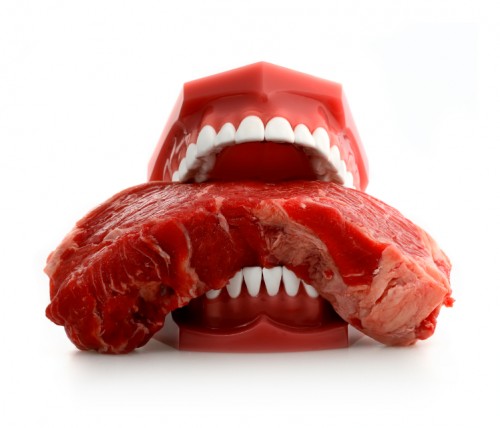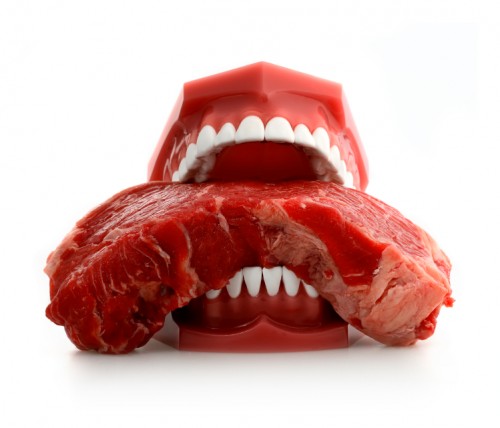Send your question to Umbra!
Q. Hi Umbra,
I was shopping in the commissary (our lovely military grocery store) this afternoon when I noticed the “reduced for quick sale” meat section. [As a former vegetarian], I literally feel the weight of the world when I buy meat … but when I saw this meat, it occurred to me that it was going to be thrown away within the next day or two if someone did not purchase it. To me, this is a worse crime: To have had that animal suffer a cruel factory farm existence only to have its meat completely wasted.
What do you think? I ended up buying some pork chops. Am I rationalizing my purchase? Am I fueling the factory farm that raised that pig? Or were they already paid when the commissary bought the meat and I just ensured the meat didn’t go to waste? What’s the best choice, to waste it or use it?
Megan S.
Fort Hood, Tex.
A. Dearest Megan,
Waste it. The lowered price does not change the essential character of the product. And if demand starts to dwindle, then ideally fewer animals will be sent to slaughter.
 You have probably already resolved this waste-or-not dilemma in other situations. What do you do when given meat for dinner at a friend’s house? The friends already bought it, so the factory farm has already been paid. The meat is cooked, and if you don’t eat it, it may be wasted. Or what about attending a State Fair? At the food stands, hamburger has already been purchased and prepared for your dining pleasure.
You have probably already resolved this waste-or-not dilemma in other situations. What do you do when given meat for dinner at a friend’s house? The friends already bought it, so the factory farm has already been paid. The meat is cooked, and if you don’t eat it, it may be wasted. Or what about attending a State Fair? At the food stands, hamburger has already been purchased and prepared for your dining pleasure.
There are many ways to protest conventional meat production — whose problems my fellow columnist Lou Bendrick has recently covered in gory detail — and I wager the most common is non-participation.
Well, no, probably omnivores sitting around and talking about disgusting factory farms is the most common (and least effective). Second most common protest is to eat less or no factory-produced meat. Avoiding meat affects multiple links in the food chain. Vendors sell less meat, hence buy less from producers, who purchase fewer calves/ chicks/ piglets/ bags of grain, and on down the line. Not that we see the impact of vegetarianism on the consumption numbers, alas: since the 1950s, the only meats we Americans have begun to eat less of are veal, eggs (nascent meat), and lamb. Our total annual poundage of meat consumption has gone from 138 pounds in the ’50s to around 220 pounds in the ’00s. I feel full.
A more promising trend is the obvious growing preference among affluent consumers for non-industrial meats. Organic certified livestock numbered about 11,000 in 1992, and in ’05 was up to 196,000; broiler chickens (aka dinner) went from 17,000 to more than 10 million. Organic and other “naturally” raised meats are better for all concerned, and I include your wallet here as a player. If you persist in eating meat (which, after all, is tasty, easy to prepare, and popular), two key habits are to eat it infrequently and buy it locally/free range-raised. These two habits dovetail nicely. Non-industrial meat is more expensive than conventional meat, hence we can afford to purchase less total poundage. But that’s OK, because we wish to eat meat less often anyway — but when we do, we wish to send a message.
Just for kicks, I tried to find out how much it costs a conventional meat farmer to raise beef. It depends on equipment and feed costs, as well as economies of scale, but the ballpark number I found was $0.658 per pound. As you note, the producer has been paid by the time the meat hits the store, so this factoid has little relevance to your purchasing decisions. But what great cocktail party conversation. Right up there with reciting the Gallic Wars.
Gallia est omnis divisaly,
Umbra




